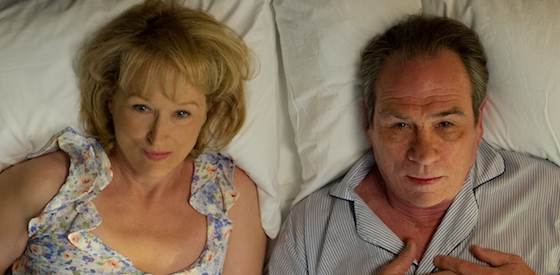- MENU
- HOME
- SEARCH
- WORLD
- MAIN
- AFRICA
- ASIA
- BALKANS
- EUROPE
- LATIN AMERICA
- MIDDLE EAST
- United Kingdom
- United States
- Argentina
- Australia
- Austria
- Benelux
- Brazil
- Canada
- China
- France
- Germany
- Greece
- Hungary
- India
- Indonesia
- Ireland
- Israel
- Italy
- Japan
- Korea
- Mexico
- New Zealand
- Pakistan
- Philippines
- Poland
- Russia
- South Africa
- Spain
- Taiwan
- Turkey
- USA
- BUSINESS
- WEALTH
- STOCKS
- TECH
- HEALTH
- LIFESTYLE
- ENTERTAINMENT
- SPORTS
- RSS
- iHaveNet.com: Movie Reviews

3 stars
Their kids up and grown, Kay and Arnold Soames, of Omaha, Neb., have been married 31 years. Kay, a retail shop worker played by Meryl Streep, has begun to count the hours within those years. Their rut, not uncomfortable but not letting in much light, grows a little deeper each day. Arnold, a stoical, irritable tax accountant played by Tommy Lee Jones, hasn't touched her in too long.
Then Kay takes a leap of faith: She cashes in some savings to take part in a couples therapy workshop conducted in a small costal Maine town, a long way from Nebraska. This is, after all, "About Schmidt" country. The Soameses probably know Jack Nicholson's Warren Schmidt from the
Steve Carell, playing it wonderfully straight, is the relationship adviser regarded with a jaundiced eye by Arnold at first sight. The town's name, Great Hope Springs, offers handy metaphorical hope. (There was a Colin Firth movie by this same name, "Hope Springs," to say nothing of the Sandra Bullock vehicle "Hope Floats.") A film called Hope has a way of pointing toward the ending that the audience suspects, all along, is coming. But "Hope Springs," a commercially savvy, shrewdly acted product, shows real nerve and considerable honesty en route to its destination.
A surprising amount of Vanessa Taylor's lean, attentive script is taken up with the counseling sessions themselves. Kay seizes on the Carell character's daily exercises and homework assignments to rekindle the couple's sensual connection. Arnold looks ashen. He says as little as possible for fear of going places, emotionally, he may never have been before. He doesn't want to give voice to anything that should've been "left unsaid" and can't be taken back, especially when it comes to his intimate life with Kay. What's left of it? Is it enough?
From the ads, "Hope Springs" looks like trouble; there's the beatific Streep, mugging (though extremely well), and Jones looking like a grump, and a tag line that says "Fall in love again this August." The movie threatens formulaic crud. It isn't. It's good.
As in director David Frankel's film version of "The Devil Wears Prada," everything is a little better, a little truer and more observant than the average film on this subject. But wait a minute: How many films have there been on this subject, really? How often do you see a mainstream American picture that spends a third of its running time talking, really talking, about a long-term couple's stickiest vulnerabilities? As Kay and Arnold struggle to reconnect, "Hope Springs" stays close to the task at hand. The characters aren't fabulously dimensional, but the actors are.
Streep's excellence is no surprise, but to some degree Jones' performance is. Often his blase authority can seem like boredom in disguise, or not disguised at all. Here, you're getting a real performance, and you really feel for the guy. Frankel keeps the easy comedy of discomfort in check. Screenwriter Taylor has spent a decade working on series television ("Gideon's Crossing," "Alias," "Game of Thrones"). This is her first produced script, and it won't be her last.
Little things bugged me about "Hope Springs," including the end credits (which depict a rather-too-radically changed main character) and the musical score, which seems nervous to reassure us that all the angst will pay off in rainbows. But it's gratifying to see a movie that doesn't have anything to do with superheroics or the end of the world, merely ordinary heroics of the human heart.
MPAA rating: PG-13 (for mature thematic content involving sexuality).
Running time: 2:01.
Cast: Meryl Streep (Kay Soames); Tommy Lee Jones (Arnold Soames); Steve Carell (Dr. Feld).
Credits: Directed by David Frankel; written by Vanessa Taylor, produced by Guymon Casady and Todd Black. A
Copyright © Tribune Media Services, Inc.
Hope Springs Movie Review - Meryl Streep and Tommy Lee Jones